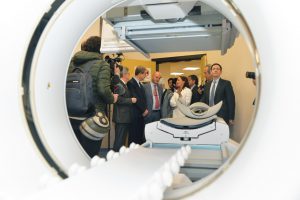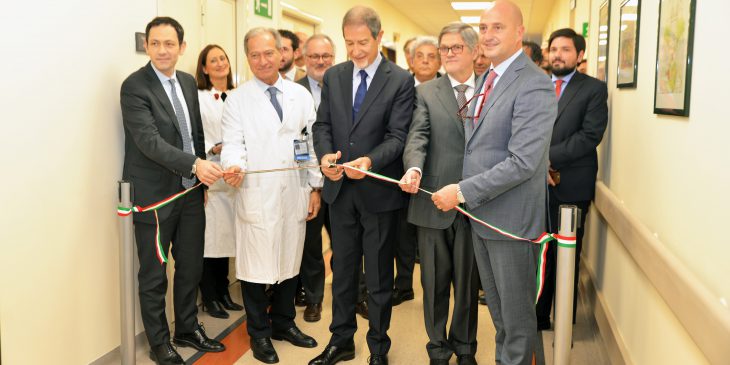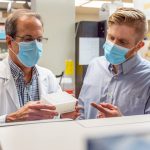UPMC-managed ISMETT, one of Europe’s leading organ transplantation facilities, is preparing to start precision medicine research projects focused on big data and radiomics, made possible by a new imaging laboratory in Palermo, Italy. Thanks to the lab’s advanced equipment, researchers will now be able to collect, store and analyze significant amounts of data using artificial intelligence and machine learning.

Leaders from ISMETT and the Region of Sicily view the hospital’s new imaging laboratory.
The goal of precision medicine is to analyze individual patients’ clinical, genomic, proteomic and imaging data to identify the treatments most effective for them. Ultimately, research will identify personalized clinical approaches for patients and determine new treatments and preventive methods for a broad spectrum of diseases. The lab is being supported by the UPMC Hillman Cancer Center in Pittsburgh, which is driving the use of big data to improve cancer care across its more than 40 locations worldwide.
“This is the new frontier of medicine, going from standard therapies for all to personalized care pathways for smaller groups of patients, with greater possibilities to cure illness while avoiding unnecessary and costly treatments,” said Dr. Angelo Luca, director of ISMETT.
The lab’s official opening was recently attended by Nello Musumeci, president of the Region of Sicily, Ruggero Razza, regional health commissioner, and Mimmo Turano, regional commissioner for economic development. The equipment was purchased in collaboration with the Department of Economic Development of the Region of Sicily with the goal of strengthening and consolidating ISMETT’s research capabilities.
Radiomics, or the use of algorithms to extract data from medical images such as x-rays and scans, is one of precision medicine’s greatest challenges. The new equipment helping to address it at ISMETT includes a specialized CT scanner that can study the entire aorta in less than a second; one that combines nuclear medicine with CT technology, and a new-generation digital angiograph—the first of its kind in Italy—to provide researchers with 3D images and richer information than was possible before.
Founded in 1997 by the Region of Sicily and UPMC, ISMETT was included in the regional health system in 2012 and two years later was designated as a government-approved research hospital. The investment in the new imaging lab will further strengthen already-existing research laboratories at ISMETT—including a new cell therapy facility, a 3D printing lab to further personalize surgical operations and a sensor lab to develop Internet of Things devices that collect not only clinical and laboratory data but also environmental, pollutant, lifestyle and health data.








